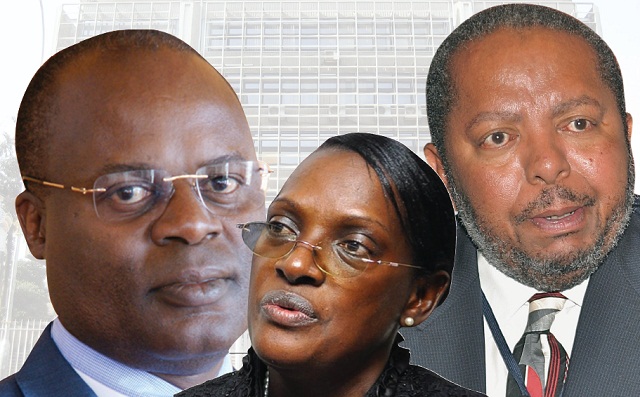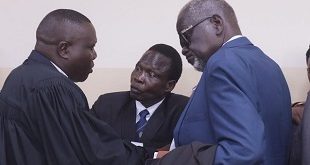
Saving Bank of Uganda: Why Kasekende, Bagyenda, Mutebile fight isn’t helpful
Kampala, Uganda | HAGGAI MATSIKO | Bank of Uganda (BoU) is under fire as its top managers; Governor Tumusiime Mutebile, the Deputy Governor Louis Kasekende, and the Director Supervision Justine Bagyenda, fight each other amidst accusations of incompetence and abuse of office. Kasekende and Bagyenda are said to be in one camp and Mutebile in another.
That BoU is under investigation by a committee of parliament and is battling several court cases, merely adds to the tension.
“This is not the Bank’s finest hour,” says Joseph Bossa, a former head of the Legal Department at BoU before he retired in 2004, “It is pitiable.”
Another official who has worked with the central bank told The Independent that the institution has become a shadow of its former self. “Previously,” the official said on condition of anonymity, “people who worked with the central bank used to walk with their shoulders high. Talking to colleagues now, you get a sense that that sense of pride is no longer there.”
Another economist who is well versed with the inner workings of BoU says that the slips at BoU have everything to do with the inability of the governor to fulfill his administrative, managerial and supervisory roles.
“There is no doubt that the governor is no longer the kind of decision maker he used to be, his ability to make decisions is questionable. It is not even clear he is aware of what is going on,” says the economist on condition of anonymity, “And because the centre can no longer hold, these slips are opening up the central bank to questions of integrity, governance and administration, which is unprecedented.”
Comments by Bossa and others, based on anecdotes and speculation of outside observers, are in line with the latest IMF findings regarding BoU.
The IMF in July published a report noting that although BoU carries out quarterly top-down stress credit and liquidity tests of financial institutions under its supervision, the Crane Bank episode illustrates that the results of the BoU tests might not be valid.
“The quality of banks’ reporting is a risk to the validity of the stress test results,” the IMF report notes.
Part of the problem is that the IMF report marks the peak of what is being described as the worst year; if not for the central bank, then certainly for its top managers – including the Governor Mutebile, the Deputy Governor Kasekende, and the Director Supervision, Bagyenda.
Although the IMF notes that it had agreed with BoU authorities that “more intrusive supervision” is required going forward, including foreign exchange and combined stress test scenarios, there are doubts surrounding the way BoU is being run.
The criticism stems mainly from its handling of the Crane Bank affair.
“How do you explain that a bank, which is ranked as best performing, closes a few years down the road like it has been struck by lightning?” Bossa said while commenting specifically on the closure of Crane Bank, “Someone must have slept on the job.”
As a result of that, a concerned citizen through lawyer, Hussein Kashillingi, sued the central bank for among others negligence, another petitioned the Inspector General of Government (IGG) to investigate Bagyenda, and owners of another bank which was also sold off by BoU; the National Bank of Commerce, are suing it.
Most of these cases are riding on information of the internal workings and decision-making at BoU which ordinarily would be exclusive but was exposed in suits against Sudhir Ruparelia, the former owner of Crane Bank.
Concerns over conflict of interest emerged given that the central bank was relying on the same lawyers at the law firm—MMAKs—led by Timothy Masembe, as Sudhir, whom they were supervising.
 The Independent Uganda: You get the Truth we Pay the Price
The Independent Uganda: You get the Truth we Pay the Price


